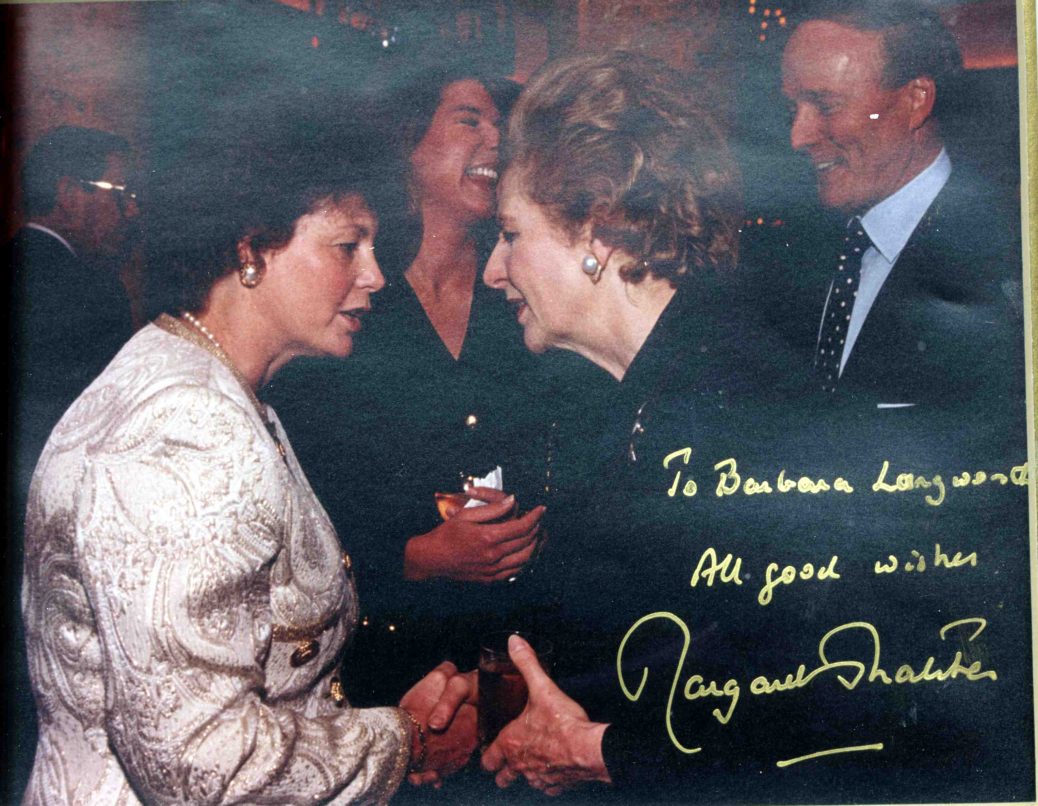
Margaret Thatcher 1923-2013: A Churchillian Remembrance
Margaret Thatcher: Excerpted from a tribute, 2013
Everyone is familiar with Margaret Thatcher’s career. Everyone depending on their politics will have their own vision. It is left to say here what she meant to the memory of Winston Churchill, the prime minister she revered above all. More than anyone who lived at 10 Downing Street, she had real appreciation for him. She read his books, quoted him frequently, even hosted a dinner for his family and surviving members of his wartime coalition.
In 1993 she was in Washington to coincide with a Churchill Conference hosting 500 people, including 140 students, a dozen luminaries, and ambassadors from Britain and the Commonwealth. Ambassador Sir Robin Renwick kindly hosted a reception for her and us at the British Embassy, inviting Colin Powell and Caspar Weinberger. Here I first caught sight of the famous leader, though my wife, a much better talker, spent more time chatting with her.
I did overhear a conversation between Lady Thatcher and General Powell, which at the time I thought singular. “Now Colin,” she was saying in her most powerful tones, “you must do it—you know you must. There is no getting around your duty.” I am told she was asking him to use his influence in solving the strife in Bosnia that had erupted the previous year.
Falklands reveries
She gave an eloquent little speech thanking America for supporting Britain in the 1982 Falklands War. The next evening at the Mayflower Hotel, I was seated next to former U.S. Ambassador to the United Nations Jeane Kirkpatrick. She wanted to know what Lady Thatcher had said.
Unknowing, I repeated her words: “Many voices in America were opposed to helping Britain. But Cap Weinberger was not one of those voices.”
There was a pause. Then Mrs. Kirkpatrick said quietly: “I was one of those voices.”
Realizing my gaffe, but opting for Napoleon’s “l’audace, toujours l’audace,” I screwed up my courage and replied: “But you were wrong, weren’t you?”
An even long pause ensued, bringing to mind Churchill’s remark: “It certainly seemed longer than the two minutes which one observes in the commemorations of Armistice Day.”
Finally Ambassador Kirkpatrick kindly said: “Yes, on reflection, I probably was.” I think this showed the power of personality that Margaret Thatcher exerted, even on those who had disagreed with her.
Lady Thatcher and The Dream
At the Embassy I presented her with a finely bound copy of Churchill’s 1947 short story, The Dream. Therein he tells the ghost of his father all that happened since Lord Randolph Churchill died in 1895. At one point, Winston says there are now women in the House of Commons. “Not many,” he assures his flabbergasted papa. “They have found their level.”
Lady Thatcher wrote me that she stayed up all that night reading the story. Later she remarked, “I roared at that one.”
“He’s with me.”
We met again at Fulton in 1996, when the National Churchill Museum marked the 50th anniversary of the “Iron Curtain” speech. They invited Lady Thatcher to give the address. Afterwards, she was surrounded by Fulton people—and by heavy security.
Celia Sandys asked, “Have you been ushered into The Presence?” No, I said. “Follow me,” she replied, approaching the guard at the inner sanctum: “I am Sir Winston Churchill’s granddaughter—and he’s with me.” We were allowed in to say hello.
Payback: at dinner that night, our generous hosts inducted two new Fellows of the Churchill Memorial. One was Margaret Thatcher. The other was me.
To my relief, they presented my gong first, which gave me a chance to say thanks and get out of the way:
“To receive this at the same time with the greatest prime minister since Winston Churchill is a unique experience.” I said that looking directly at the great lady….who gave me a benignant wink.
The debt we owe
It was years before the gratitude due to her was toted up. As a regular visitor in those years, I could not help but notice the palpable improvement in the lot of Britons. Anyone who saw her in Parliament witnessed her devastating effectiveness in debate.
No one who admires principle and courage could help but admire her devotion to them, win or lose. The poll tax issue some say was her downfall in 1992 manifested her principle that the cost of local government should be paid by all, including those who previously paid nothing, while voting for everything.
Internationally, she was always out front. Her reaction to tyrants, from Leopoldo Galtieri to Saddam Hussein, was consistent. She was the first to say “we can do business” with Gorbachev. More than talk, her support of the Anglo-American alliance was an article of faith.
Her relationship with President Reagan was a model we may never see again. Yet when she disagreed, as over Grenada or Strategic Defense, there was no doubt where she stood. She fought the good fight and made a huge difference, for a time.
I fear betimes that her era is past, lost in a collectivist and globalist dream. Be that as it may, I have no hesitation in paraphrasing Sir Winston’s words about Roosevelt. She was the greatest British friend we have known since Churchill, and one of the greatest champions of freedom who ever brought help and comfort from the old world to the new.
Further reading
“Margaret Thatcher and Winston Churchill: Two Meetings,” 2023.






